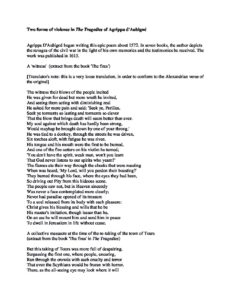Agrippa D’Aubigné began writing this epic poem about 1572. In seven books, the author depicts the ravages of the civil war in the light of his own memories and the testimonies he received. The work was published in 1615.
A ‘witness’ (extract from the book ‘The fires’)
[Translator’s note: this is a very loose translation, in order to conform to the Alexandrian verse of the original]
The witness their blows of the people incited
He was given for dead but more wrath he invited,
And seeing them acting with diminishing zeal
He asked for more pain and said: ‘Seek ye, Perilles,
Seek ye torments so lasting and torments so clever
That the blow that brings death will seem better than ever.
My soul against which death has hardly been strong,
Would mayhap be brought down by one of your throng.’
He was tied to a donkey, through the streets he was driven,
Six torches aloft, with fatigue he was riven.
His tongue and his mouth were the first to be burned,
And one of the fire-setters on his victim he turned;
‘You don’t have the spirit, weak man, won’t you learn
That God never listens to our spirits who yearn?’
The flames ate their way through the cheeks that were roasting
When was heard; ‘My Lord, will you pardon their boasting?’
They burned through his face, where the eyes they had been,
So driving out Pity from this hideous scene.
The people saw not, but in Heaven sincerely
Was never a face contemplated more clearly;
Never had paradise opened of its treasure
To a soul released from its body with such pleasure:
Christ gives his blessing and wills that he be
His master’s imitation, though lesser than he.
On an ass he will mount him and send him in peace
To dwell in Jerusalem in life without cease.
A collective massacre at the time of the re-taking of the town of Tours
(extract from the book ‘The fires’ in The Tragedies)
But this taking of Tours was more full of despairing,
Surpassing the first one, where people, uncaring,
Ran through the crowds with such cruelty and terror
That even the Scythians would be frozen with horror.
There, as the all-seeing eye may look where it will
It notices the hand and the knife that do kill.
There three hundred people, three days starved are lying,
Cast out from the church of the faubourg, half dying,
There, ready for the butcher bands to deliver
Them, herded, taken to the banks of the river,
There, no pity for the moans of what befell them,
There, children in the water, the knight that would sell them,
Dragged to the merchants, thus to die without knowing
Their names, their sins, their age, or where they are going.
But may crimes be committed before drawing breath?
‘Tis enough to be able to die, for their death.
They must suffer the taste of their death by the knife
Those children who have not even yet tasted life.
Thus trembling they are dragged to the bridge on the water
Beneath it their days are completed with slaughter,
Torn with such cruelty from the breasts of their mothers,
Clinging to the knees of the killers of their fathers,
Their little feet wet with their blood, not with water,
For a day, for all time, to the men that did slaughter,
They pray that the rod in their their pain will make good,
Something noble, in this age of carnage and blood.
